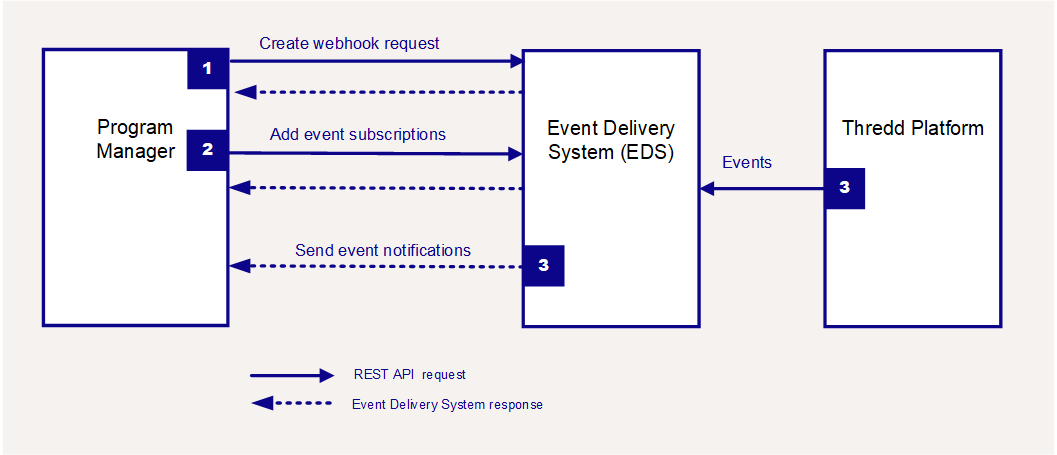Webhooks (Event Delivery System)
Webhooks is a comprehensive service designed to facilitate real-time event subscription and notification delivery.
You can use the Thredd REST API to create and update webhook endpoints, and specify desired events for notification for the endpoints. Additionally, you can retrieve historical or missed events on demand, update your details, and manage event subscriptions.
Webhooks provide a robust platform for efficient event-driven interactions, retrieving notification details, subscribing to events, and re-sending notifications. The advantage of webhooks is that there is no persistent open connection to the system where you need to keep filtering for events that you are interested in. It is an asynchronous mechanism where you wait for the system to notify you. The HTTP payload will contain the details of the event. Before using webhooks, you will need to setup a URL that can listen for any alerts.

Figure: Webhooks Process
Key Features
Some of the key features of using webhooks are:
-
Instantly receive notifications as events happen, ensuring your system stays up-to-date with activity on your programs.
-
Gain full control by independently creating, configuring, and managing webhook endpoints, subscriptions, and notifications. The Thredd self-service platform simplifies integration and allows for efficient adjustments.
-
Leverage a consistent and repeatable framework for webhooks that ensures a uniform user experience and straightforward integration.
-
Our webhooks are designed to seamlessly scale with your evolving needs, supporting increasing volumes and use cases.
-
Benefit from reliable webhook delivery with built-in automatic retries and error handling. This ensures that missed or failed events are retried, maintaining the integrity of your data flow.
-
Efficiently retrieve and manage historical events with the Thredd system, allowing you to access past notifications and ensure that no critical information is lost, even if initial delivery fails.
Benefits of Using Webhooks
-
Reduce Costs: Save by eliminating continuous polling and redundant API calls.
-
Streamline Operations: Automate processes to boost efficiency as your business scales.
-
Drive Innovation: Access new notifications and enhanced data to support your unique business need
-
Enhance Customer Interaction: Deliver instant updates and use modern communication to engage and delight your customers.
Event Notifications
When a webhook has been created, events can be created for them. An event is an activity that happens outside of your system, such as a card transaction or card being blocked. For example, a fraud event is triggered which causes the card to be suspended. The webhook is then sent the details of the attempted transaction, allowing you to proactively contact your cardholder.
The currently supported events are described in the following table.
|
Event Code |
Description |
|---|---|
|
101 |
Supports when a fraud rule is triggered by a transaction. |
|
102 |
Supports when a fraud alert is closed, either from your confirmation using the API, or 3 days after the alert was triggered. |
|
103 |
Supports notifying a customer when a card status changes. This event code will also send an EMV chip block script when an irreversible card status is set. |
|
104 |
Supports notifying a customer when a customisable PAN is created. |
|
105 |
Supports notifying a customer when there's a potential scam payment on their card. |
|
106 |
Supports notifications sent for Tokenisation Authorisation Request (TAR) tokenisation requests. |
|
107 |
Supports notifications sent for Activation Code Notification (ACN) tokenisation requests. |
|
108 |
Supports notifications sent for Tokenisation Complete Notification (TCN) tokenisation requests. |
|
109 |
Supports notifications sent for Tokenisation Event Notification (TEN) tokenisation requests. |
|
110 |
Supports notifications sent for failed token status changes. |
|
112 |
Supports notifications sent for transaction confirmation events. |
|
115 |
Supports notifications sent when Fraud Transaction Monitoring (FTM) creates an alert. |
For more information see the Cards API Website: Introduction to Webhooks.